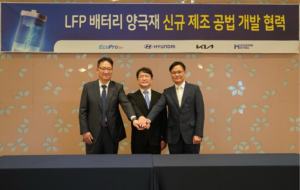
Hyundai Motor, Kia launch new EV battery manufacturing process and software-defined vehicle partnership
By onAnnouncements | Market Trends | Technology
Hyundai Motor Co. and Kia Corp. are ramping up their efforts to enhance competitiveness in future electric vehicle (EV) batteries through a project they’ve launched to develop lithium iron phosphate (LFP) battery cathode material, according to a joint news release from the companies.
In collaboration with Hyundai Steel and EcoPro BM, the venture aims to synthesize materials directly without creating a precursor for LFP battery cathode material production.
“To meet future demand in the EV market, rapid technological development and effective battery supply chain establishment are essential,” said Soonjoon Jung, vice president and head of the Electrification and Driving Materials Development Group at Hyundai Motor and Kia, in the release.
“Through this project, we aim to reduce import reliance and enhance the technological competitiveness of the country and Hyundai Motor Group by internalizing necessary technologies.”
Traditionally, LFP battery cathode materials are produced by adding lithium to precursor materials like phosphate and iron sulfate, according to the release; however, the direct synthesis process simultaneously adds phosphate, iron powder, and lithium without creating a separate precursor.
Hyundai and Kia say the direct synthesis process reduces hazardous substance emissions during manufacturing and lowers production costs.
To increase production efficiency, ensuring impurity-free and uniformly sized raw materials is crucial, according to the companies.
In collaboration with Hyundai Steel, Hyundai Motor and Kia will develop high-purity fine iron powder processing technology using domestically recycled iron. EcoPro BM will then use the technology to develop directly synthesized LFP battery cathode material using iron powder raw materials.
The goal is to develop LFP cathode material that enables fast charging technology and exhibits high-level charging and discharging performance at low temperatures, the release says.
“This collaboration carries significance as it connects the steel, battery, and automotive sectors,” the release says. “By integrating technology in the LFP battery material field, Hyundai Motor and Kia aim to spearhead advancements in the EV market.”
Hyundai and Kia are also working on strengthening the connection between software-developed vehicles (SDVs) and smartphones through a partnership with Samsung Electronics.
The goal is to secure a leading position in the mobility service ecosystem, according to the companies.
The companies are working on a next-generation infotainment system and an open mobility ecosystem in collaboration with Hyundai Motor Group’s global software center, 42dot. The development aims to provide a user-centered vehicle environment, enhancing the connectivity of the infotainment system, set to be unveiled in 2026.
“Our goal is to enrich Hyundai Motor and Kia customers’ mobility experience by offering personalized services that extend beyond transportation, seamlessly integrating vehicles with smartphones,” said Chang Song, president and head of Hyundai Motor Group Advanced Vehicle Platform (AVP) Division, in a news release.
Hyundai Motor and Kia will develop technology to organically link SDVs and the smartphone ecosystem using Samsung Electronics’ global Internet of Things (IoT) platform, “SmartThings,” according to the release.
By integrating with the platform, the companies say the entire process of vehicle use will be seamlessly connected to smartphones.
“Through our collaboration with Hyundai and Kia, customers will experience the convenience of ‘SmartThings,’ not only at home but also in their vehicles, transcending space,” said Paul (Kyungwhoon) Cheun, president and CTO of DX Division at Samsung Electronics and head of Samsung Research, in the release. “We will continue to expand the SmartThings ecosystem, offering new lifestyles and value to even more customers.”
Through strengthened connectivity, Hyundai Motor, Kia, and Samsung Electronics say they’ll introduce a service for vehicle location verification that will be expanded and advanced through integration with “SmartThings Find,” a global vehicle location tracking service.
The service is accessible via a crowdsourced network of hundreds of millions of Samsung Galaxy devices that use Bluetooth Low Energy (BLE) technology to report their location, without restrictions related to cellular coverage.
Customers can easily check their vehicle’s location through the Connected Car Service app in unexpected situations, such as forgetting where they parked or in case of theft, the release says. Hyundai or Kia customers whose vehicles aren’t registered with the Connected Car Service can check the location through the Samsung SmartThings app.
Hyundai Motor and Kia say they will also simplify the new member registration process by linking user accounts with Samsung Electronics. In the future, they plan to provide services optimized for customers’ lifestyles and tastes, such as healthcare, pet care, and vehicle interiors, and continue to cooperate with Samsung Electronics to provide new mobility experiences.
Hyundai Motor and Kia, together with 42dot, plan to continuously develop services for convenient and enjoyable mobility experiences by sharing vehicle data application programming interfaces (APIs) and software development kits (SDKs) with various business partners, including Samsung Electronics, through the next-generation infotainment system based on an open ecosystem, the release says.
Images
Featured image: (From left) Hee-Joong Im, Vice President and Head of Advanced Technology Development Group at Hyundai Steel; Junwon Suh, Executive Directer and Deputy Manger of R&D Planning Department at EcoPro BM; and Soonjoon Jung, Vice President and Head of the Electrification and Driving Materials Development Group at Hyundai Motor and Kia. (Provided by Hyundai)
